
Sydney Rows
A Centennial History of the Sydney Rowing Club, 1970, by A L May
Table of Contents
Chapters
- Preliminaries: before 1870
- Foundations: 1870-1880
- New Clubs: 1880-1890
- The Amateur Question: 1890-1900
- Sydney on Top: 1900-1910
- Henley and War: 1910-1920
- Pearce and Mosman: 1920-1930
- Financial Problems: 1930-1940
- War and Wood: 1940-1950
- Strength and Stability: 1950-1960
- On Top Again: 1960-1970
Appendices
11. On Top Again: 1960-1970
Chapter Eleven page 1 2 3 4 5 6
Other Clubs
It was a decade of development for a number of other clubs. On the river, Haberfield proved the most successful, with three wins in the premiership, one in the junior pennant and a win in the senior pennant which was introduced in 1969/70. Mosman had one premiership win and five seconds, together with two wins in the junior pennant and five seconds once again. Apart from Sydney, Leichhardt and Glebe were the only other clubs to win a pointscore (the premiership in 1960/61 and the junior pennant in 1969/70 respectively). Drummoyne got up to second place in the junior in 1965/66, while Nepean finished third in this division in both 1967/68 and 1968/69.
Mosman had some temporary difficulties early in the decade, involving the cancelling of its licence in 1962, but its affairs were soon beyond reproach and an appeal was upheld. In June, 1967, a new $74,000 clubhouse was opened at the Spit while extensive renovations to the Mosman Bay shed were also undertaken.
Haberfield also made substantial renovations to its premises and, in 1963, was able to qualify for the grant of a liquor licence. Glebe gained its licence soon after, with considerably enhanced strength following.
After long-term efforts, Drummoyne, too, was granted a licence and opened a new club house early in 1968. St. George Rowing Club opened its new shed in 1962 and, despite limited rowing success, was soundly established by the end of the period. Nepean, the remaining licenced club, continued to function very successfully.
The fortunes of other clubs varied. Leichhardt was not helped by the wrecking of its boat shed by vandals in 1961 and it steadily declined from its pre-eminent position. In 1965, assistance from the prosperous Apia Soccer Club was offered, but this was rejected. The year 1968/69 was, however, the club's poorest since the war.
Activity at North Shore also died right away but Balmain took a new lease of life and was a force to be reckoned with on the river for virtually the whole decade.
The new club, Colleagues, won a number of important races, though with a very small active membership. The Scotsmen Rowing Club failed to survive into the new decade and Hawkesbury ceased operating in 1961/62. A new metropolitan club - Waringah Boat Club-was formed late in 1966 but had achieved no success on the river by the end of the decade. A club composed of ex-Shore oarsmen, "Torchbearer Rowing Club", was formed in 1962, but its application for affiliation with the RA was rejected (principally because it was felt its members should join and strengthen existing clubs).
Sydney University competed more frequently in open races than for many years past. In the intervarsity races, the club won three of the first four and finished second on the other occasion. A race for lightweights was added to the programme in 1962/63, along with the sculling event, but in 1964/65 the carnival was not held. In each subsequent intervarsity regatta, Melbourne proved successful in the eights. Crews from the University of NSW, Newcastle University and the Australian National University also took part in intervarsity and open racing. The distance of the intervarsity race was amended to 2000 metres from 1969.
Competition from country clubs was a feature of the ten-year period in Sydney. Crews competed from Manning River, Grafton and Lismore while, after Lake Burley Griffin was completed, rowing commenced in the ACT and crews from Canberra and the Burns Club were soon also racing. In return, large squads of oarsmen from SRC and other clubs traveled to Taree, Lismore and other sites for regattas over the Australia Day and Easter holidays.
A number of new country clubs commenced: Illawarra - at Wollongong - in 1960/61, and Tweed Heads and Coolangatta Rowing Club and Griffith Rowing Club in 1966/67 (the latter soon becoming prominent). In 1962, the Maclean Rowing Club amended its rules and gained affiliation with the Northern Rivers District Rowing Association.
The champion junior sculls of NSW was won in 1965/66 by Islay Lee of Lismore and, in accordance with the arrangement with the NRDRA, the event was held on the northern rivers the following year. Lee was successful again and also in 1967/68.
Friendly but intense competition continued to mark the winter Cock-o'-the-Harbour series. The results of the first eight years were Sydney; Mosman; Sydney; Mosman; Sydney; Mosman; Sydney; Mosman. The pattern was destroyed, however, by Mosman which also won in 1968 and 1969 to finish on top for the decade as a whole. The results of both the 1961 and 1962 competitions were decided on the last race of the last regatta. North Shore and St. George continued to be keen competitors in the annual event.
The J.B. Sharp series was also keenly contested and the trophy seems to have been shared well around with Leichhardt, Balmain, Haberfield and Glebe all successful on occasion and Drummoyne doing everything but winning.
Racing
The first season of the new decade reverted to the usual programme, with no international events being scheduled and requiring test races. Sydney scored a good number of wins in the first half of the season, mainly in the junior and lightweight senior division, although the senior eight of John Magner (bow), Lachie Carnegie, Mark Henderson, John Williams, Alf Duval, Stewart Derwin, Neil Smith, Ian Toll (stroke) and Graham Thurkettle (cox) scored a win at Mosman's regatta.
All State championships were conducted over 2000 metres and, in the champion eights, it was the Colleagues crew, coached by Alan Callaway, which led the way home. With Tutty still abroad, Bill Mison, rowing for Mosman, won the sculling championship while Leichhardt again proved too good in the lightweight division.
SRC had, however, some big moments left. The club took out the champion junior eights, the crew being Graeme Thorburn (bow), Greg Hancock, Bruce Downie, Col Franklin, Gary Eggleton, Stuart Agnew, Don Brewer, Jim Goulding (stroke) and Graham Thurkettle (cox). John Wallis won a number of maiden sculls and, at one country regatta, annexed the title of "Champion of the Northern Rivers".
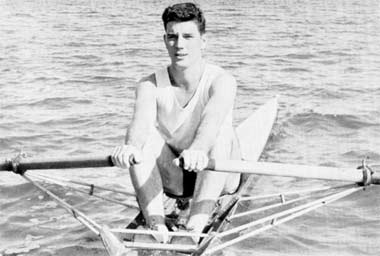
John Wallis
The senior four of May (bow), Toll, Duval, Letts (stroke) and Ken Lloyd (cox) scored further wins, while, finally, the club was victorious in the Riverview Gold Cup, the crew being the same as for the champion junior eights with Duval and Derwin replacing Hancock and Downie.
The 1961 King's Cup was set down for Adelaide in May. The NSW crew, selected by Webb and Evatt, was relatively young and inexperienced, containing five members of the winning Colleagues eight - Peter Shenstone, John Campbell, John and Stuart McGill and Bob Sample - together with Hugh Chalmers of Haberfield and Mick Allen and Kevin Evans of Mosman. Victoria led in the big race almost from the start and beat NSW, the main challenger, by 2/3 length with WA a length back third.
In the sculls, Mison did well early but faded to finish out of a place. Rodger Ninham of WA won from Squires of Tasmania. NSW was successful in the Penrith Cup event, beating WA by 1/2 length.
The 1961/62 season made up for any lacklustre of the previous year. In the first half, an Australian team visited NZ for a series of races and, at its end, the first-ever Australian National Championships were conducted while preparations for the First World Championships and for the 1962 Empire Games in Perth were well underway.
Test races for NZ selection were conducted by the NSWRA on behalf of the AARC in November. The eight-oared event was won by Mosman and the sculling event saw Rodger Ninham, the WA Olympian, now transferred to Mosman, defeat Ian Tutty. An all-Mosman eight, comprising Hyman (bow), Johnman, Palmisano, Herford, Tipping, Kevin Evans, Allen, and Bruce Evans (stroke), made the trip. Eric Longley was coach and Geoff McIntyre manager.
In NZ, three "test" regattas were conducted, with a well-trained NZ eight comfortably beating Australia in all three events and Hill, the NZ sculler, also defeating Ninham on all three occasions.
Sydney scored 22 wins in regattas in the first half of the season. Heading the list with five wins were the maiden four of Don MacIver (bow), Peter Gwalter, Frank Davies, Geoff Knight (stroke) and Mark Whale (cox) and the lightweight maiden four of Bruce Holden (bow), M. Henderson, P. Salter, Ray Green (stroke) and Larry Parker (cox). John Wallis scored a win in the newly-introduced champion junior sculls of NSW.
Sydney's seniors also had some good wins in warm-up events for the State championships. Due to adverse conditions, the big race was transferred from the Nepean to the Parramatta. The title was won by Sydney with Leichhardt beating the title-holders, Colleagues, for second place, a length behind Sydney. The victorious crew was boated Don Brewer (bow), Stuart Agnew, Mark Henderson, Ted Heinrich, Alf Duval, Stewart Derwin, Neil Smith, Jim Goulding (stroke) and Ken Lloyd (cox). Tutty defeated Ninham in the sculls (with Wallis well up third), while Leichhardt won the lightweight fours championship by 2 1/2 lengths from Sydney - for the tenth time in a row.
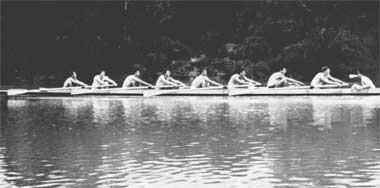
The Champion Eight of NSW, 1961-62
Further success came Sydney's way in remaining regattas, although only one more championship - through Alan Murphy (bow), Smith, Duval and Derwin (stroke) in the coxless fours. The maiden four of Bill Glover (bow), Carl Cameron, Bob Wallwork, Ross Cornwell (stroke) and Mark Whale (cox) scored six wins while the club's lightweight senior eight of Terry Bourne, Rod Whereat, John Magner, Peter Gwalter, Frank Davies, Greg Hancock, Geoff Knight, Alan Simons (stroke) and Larry Parker (cox) had three wins but, unfortunately, failed by a length to secure the State title.
The King's Cup and the first-ever National Regatta remained to be held. The State selectors were Gould and Chapman together with Cayzer, coach of the winning eight. They chose four Sydney men - Derwin, Duval, Smith and Goulding - along with Herford and Allen of Mosman, Campbell of Colleagues, and Lowrey of Leichhardt. Lloyd was chosen as coxswain and Agnew and Brewer the two emergencies.
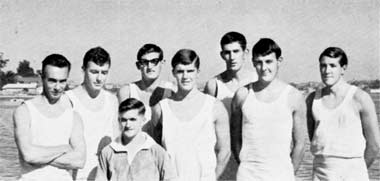
1962 Interstate Representatives
Left to right: Geoff Knight, Stuart Agnew, Ken Lloyd, Alf Duval, Jim Goulding, Neil Smith, Stuart Derwin and Don Brewer
The State lightweight four was, again, an all Leichhardt crew, but with Geoff Knight the emergency.
The King's Cup regatta was held at Lake Wendouree in March, 1962, with the two main events being test races for Australian representation at the forthcoming British Empire and Commonwealth Games in Perth. (Mackenzie, who won his fifth Diamond Sculls in a row in 1961, had been informed that he must return to Australia to compete in the sculling championship if he wished to represent Australia in the Games.)
Heats were conducted in each event, with NSW qualifying for each final. The eights final went to Victoria, 1/2 length ahead of WA and Tasmania 1 1/2 lengths back third. NSW was 1/2 length further back still. Ian Tutty had an easy win in the sculls, with Squires of Tasmania recording yet another second. Victoria proved too good for NSW in the fours, winning by 4 lengths with WA third.
Lake Wendouree was also the site of the first National Regatta, held from 21 to 23 April, 1962. Seven Australian championships were conducted-for double sculls, coxed four, coxless four, coxless pair, coxed pair, lightweight eight and lightweight sculls - the first four also carrying with them Empire Games representation. SRC oarsmen rowed in three crews in Ballarat but their best performances were second to Mercantile in the lightweight eights and second again in the coxless fours (a composite crew). A Mosman four of Hatfield (bow), Grace, Raper and Ninham (stroke) won the coxless four and Raper and Ninham also won the coxless pair. Tutty and Barclay Wade of Haberfield won the double sculls and Corio Bay won the coxed fours.
International rowing now commanded the spotlight once again. First there were the First World Rowing Championships, held in Lucerne, Switzerland, in September, 1962. Australia was represented by the Empire Games eight from Victoria, by a coxless four, also from Victoria, and by Tutty in the sculls. Geoff McIntyre managed the team, the overall financial burden being eased by a 40 per cent subsidisation of travel expenses by the organisers.
Twenty-five nations entered crews for the seven Olympic classes of boat. In its heat, the Australian eight finished second to Canada, but it rowed magnificently next day to win the repechage and enter the final. The first five crews broke six minutes in the final, with West Germany winning in 5.50.8. Australia finished fifth, behind USSR, France and Italy but ahead of Canada.
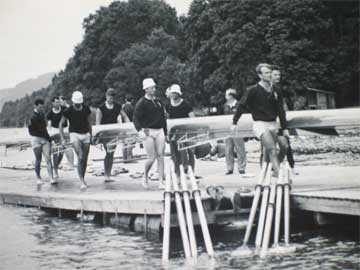
Australian eight in Lucerne
The crew was boated Ian Douglas (bow), Charles Lehman, Dave Boykett, Terry Davies, Paul Guest, Graeme McCall, Martin Tomanovits, Neville Howell (stroke) and David Palfreyman (cox) with Alan Jacobsen coach. The Australian four repeated the effort of the eight: second in the heat, first in the repechage and fifth in the final. Tutty came third in his heat and second in the repechage and finished fourth (tenth overall) in the little final. West Germany dominated most events, with wins in the coxed four, coxless four, coxed pair and coxless pair, as well as the eight.
Australia's eight turned in another great performance at the Perth British Empire and Commonwealth Games. Changes took place in three of the Australian crews before the Games commenced late in November, 1962. Firstly Webb, the sculling selector, chose Squires to partner Wade in the double sculls, thus allowing Tutty to concentrate on the singles. Secondly, there was unfortunate dissension between members of the coxless four and coxless pair, their coach Wim Sirks, and the manager, Noel Wilkinson of Victoria. Raper was replaced in the pair by Hatfield and then difficulties arose in the coaching of the four. Hatfield and Ninham were withdrawn from the four being replaced by Newcomb and Boykett, the two Victorian emergencies. The training problems of the new four were aggravated when Mosman Rowing Club raised objections, albeit temporary, to their club's boat being used by other than the originally selected crew.
The Australian eight disappointed in its heat, being beaten by England, but they beat Canada in the repechage and went on to meet England and NZ in the final. NZ led Australia by a canvas or more to the 1500 metre mark but Australia's great finish took them past NZ to a win by 2 feet in the Games record time of 5.53.4. England was several lengths back third. Australia finished second in the coxed four, hard on the heels of NZ, while Tutty, the double scull and the coxless pair all finished third. The coxless four failed to qualify for the final. England won three of the six events and NZ the other two.
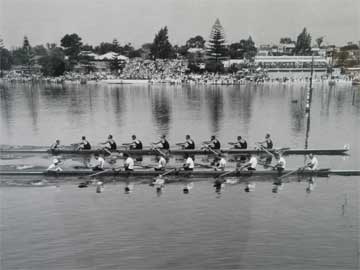
Finish of the men's eight at Commonwealth Games
The remainder of the 1962/63 rowing season in Sydney was relatively normal. One of the features was the holding, in January, 1963, of a Rowing Camp and Promotional Regatta at the National Fitness Camp, Narrabeen Lakes. Sydney's senior ranks were strengthened by the transfer to the club of two King's Cup oarsmen - John Campbell and Mick Allen.
In senior events, the club had a dozen wins during the season, including the champion coxed and coxless fours. In the champion eights, however, the club finished only second, 2 lengths behind Colleagues and a foot ahead of Leichhardt. Sydney's lightweight senior oarsmen succeeded in winning the champion lightweight fours of NSW, the crew being Alan Simons (bow), Geoff Knight, Don MacIver, Greg Hancock (stroke) and Larry Parker (cox). John Wallis successfully defended his State junior sculls title, while numerous good wins were recorded by the club in the novice, maiden and junior divisions. By the end of the season, wins in both pennants had been achieved.
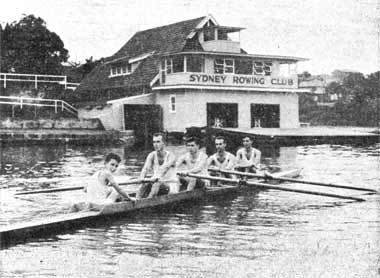
The 1962-63 champion lightweight four
The interstate events were held in Brisbane early in May, 1963, and Sydney had eight representatives in the NSW team. Duval and Allen gained selection in the eight along with Shenstone, Young, Stuart McGill and Northam of Colleagues, Herford of Mosman and Hudson of Leichhardt. The lightweight four included Simons, MacIver and Hancock of Sydney together with Henderson of Leichhardt. Parker was cox, Knight emergency and Norm Grounds coach.
The King's Cup event was an exciting one, with Victoria and WA disputing the lead for most of the way and Tasmania and NSW well up. With 100 metres to go, NSW raced past the others to take the lead, but the very experienced Victorian eight came again and succeeded in beating NSW to the line by a canvas. WA was 1/2 length back third.
The new NSW sculling representative, 19-year-old Bob Shirlaw of Mosman, finished third in the President's Cup behind Squires of Tasmania and Sykes of Victoria. The State's only win came in the Penrith Cup, which commenced in a blinding rain storm. NSW quickly went to the lead and retained it throughout the race, successfully withstanding a late challenge from Victoria to go away to a 3/4 length win.
